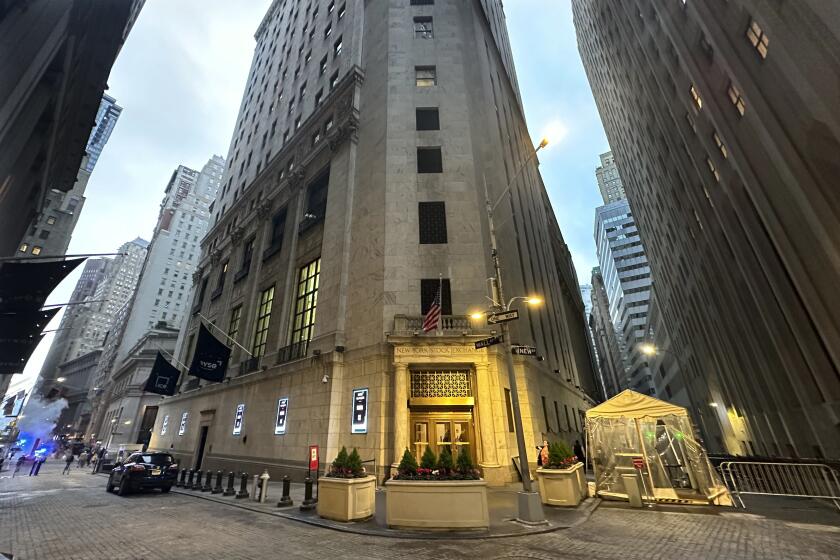Employees Answer the $38-Million Question
Just a few mornings after Kingston Technology Corp. gave employees $38 million in bonuses, the first Porsche rolled into the parking lot.
It was a black Turbo Carrera, a sleek speedster that other employees greeted with “wide-eyed glares,” said its driver, Keith Kline, a 33-year-old sales manager.
It was also a joke.
“I borrowed it from a friend,” Kline recalls with a laugh. “Three days later I was back driving my 11-year-old Ford Thunderbird.”
With payouts from its unprecedented bonus program surpassing $300,000 in some cases, the Fountain Valley company’s 523 employees became the envy of the working world.
Three months later, though, the ethos at Kingston is still more sedan than sports car.
Not that some employees didn’t act on their dreams . . . or face temptations. In the days after the announcement in December, employees were divebombed by financial vultures.
BMW salesmen passed out business cards in the company lobby, and telemarketers pestered workers by phone, urging them to buy everything from mutual funds to desert property “just a short 45-minute commute from Las Vegas.”
“They tried to ask me to invest in stock, to buy life insurance, accident insurance, and some called me to offer early-bird discounts on a car,” said Minh Nguyen, who heads the shipping department.
The high-tech industry is full of stories about Ferraris and Silicon Valley mansions purchased by engineers who got rich on stock. But Kingston isn’t an ordinary high-tech company.
In an industry of flash and quick fortunes, the firm was built by two Taiwanese immigrants--John Tu and David Sun--who treat workers like family, and who preach humility and responsibility. For the most part, employees such as Nguyen and Kline made sure that those values prevailed.
“Everybody has been pretty conservative,” said Kline, who used his money to buy a house. “It speaks of the values that have been instilled by John and David.”
That is not to say that nothing has changed since the bonus checks--ranging from $2,000 for recent hires to well into six digits for veterans--were passed out Jan. 6. It’s just that much of the fallout was unexpected.
Sun and Tu have been lauded for striking a blow against corporate greed, but they also have been stung by rebukes from executives at other companies who saw Kingston’s bonuses as an unwelcome threat to the employee compensation status quo.
For the company’s workers, the event seemed easy enough to interpret. Employees, many of them immigrants who came with little more than hope, would be able to enjoy big bites of the American dream. In fact, some have bought cars and houses, many paid off debts, and others gave to charities and their families.
But reality is not so tidy. And if the money brought a great deal of joy, it also brought complications.
Jeannine Moynahan used part of her bonus to hire a private investigator to help her 18-year-old daughter locate her father, who abandoned the family before she was born.
“Since she was tiny, she had always talked about how she had a hole in her heart,” said Moynahan, 37, a saleswoman.
Moynahan is remarried, and her household has four children. The bonuses helped the family pay off lingering debts, plus get Moynahan her dream car: a 1987 Mercedes 190 that her husband purchased at an auction for $4,000.
Although the family is thankful for the money, Moynahan frets that it has also exposed deep emotional wounds.
Her daughter’s father was found in Washington state. She sent him two letters, one of them delivered and verified by UPS. But months later, he still has not responded.
“I didn’t want her to be hurt again,” Moynahan said. “But she was willing to take the risk.”
Devoted Employees
Since they founded the company in 1988, Sun and Tu have had an unorthodox but effective approach to business. They never borrowed a dime, refused to sell stock in their company, did deals on handshakes, and to this day reject offices in favor of ordinary cubicles in the center of the company’s sales floor.
Responding to values taught by their parents, and to their disaffection with the way they were treated as employees, they have forged unusual bonds with their workers. They promise jobs for as long as the company lasts, and share profits with employees every quarter.
In return, employees are tireless, devoted and extremely loyal. Turnover is less than 1% a year.
When Sun and Tu sold 80% of Kingston, which makes computer memory products, to Softbank Corp. of Japan last year for $1.5 billion, they insisted that they continue to run the company the way they always have.
They also set aside $100 million for workers. Of that amount, $38 million was paid out in January, with most workers getting twice their annual salaries. The rest has been set aside for bonuses in the coming years.
Sun and Tu cautioned employees to use the money wisely, urging them to pay off their debts and set aside money for their children and their future. And that is what many workers did.
Ron Seide, a general manager at the company, set up separate $20,000 accounts for his sons, and put the rest of his six-figure bonus into low-risk investments including mutual funds. His only extravagance was a $500 pair of eyeglasses.
“Color me dull and responsible,” he said.
A few employees were more adventurous.
Darin Ferriola, a product manager, took a leave of absence to make a movie about Generation X workers in a high-tech company.
Brandi LaPlante, a sales manager for nearly six years, was the only employee to leave. LaPlante, who joined a budding computer networking company in Irvine, said the new job offered better chances for advancement, but that it was a difficult decision.
She and her husband had their new house in Foothill Ranch landscaped. She also purchased a computer for her three young children and took them shopping for clothes. After the bonuses, her 9-year-old daughter started wearing a Kingston jacket to school because the other children would say: “Your mom is rich.”
LaPlante also went looking for a new car, fighting off rabid salespeople all the way.
“When I filled out my credit application and wrote down my employer, they assumed I was a millionaire,” she said. “Suddenly, they were showing me more expensive vehicles, and the numbers were adding up to about $5,000 more than the sticker price. I said, ‘Goodbye.’ ”
But LaPlante simply went elsewhere and made down payments on a new Jeep Grand Cherokee for her and a new truck for her husband.
Unexpected Consequences
The bonuses brought some things that money is not supposed to buy.
Michael Bray, a sales analyst, said he had suffered from high blood pressure for years. He had been out of work before joining Kingston four years ago, and still had lingering debts. He had a teenage daughter entering college, plus a 2-year-old at home.
“My blood pressure was 160 over 130, and anything above 90 is serious,” said Bray, 51. “My doctor said I had to bring it down or I was going to have a heart attack.”
But the condition disappeared almost as quickly as he deposited his check. Bray set up college funds for his children, paid off his debts, and set aside money for a down payment on a house. His blood pressure plummeted to 110 over 80.
“My doctor asked me what was going on in my life and I told him I worked at Kingston,” Bray said. “He asked if he could get a part-time job there.”
Hostile Reactions
Kingston answers that question these days with a sign taped to the company’s doors.
“Kingston is not currently accepting any unsolicited job applications or resumes,” the sign reads. “Thank you for your interest.”
The sign is a reminder of the frenzied scene at the company’s headquarters in the days after the bonuses were announced.
Television news crews flocked to the building, salespeople left brochures in the lobby, resumes flowed into fax machines, and receptionists handled as many as 1,000 calls per hour.
Sun and Tu both say they have been overwhelmed by the thousands of supportive letters and calls they have received from across the country. Because of that reaction, “I am more than ever convinced that what we do is right,” Tu said.
But Kingston executives have also been stung by hostile responses from their counterparts at other companies, including their own suppliers and customers.
Gary MacDonald, vice president of marketing, said he was taken aback by the remarks of a client during a meeting shortly after the bonuses.
“You’re making the rest of us look bad,” the man said. “I can’t tell you how many press clippings [about the bonuses] my employees have taped to my door.”
Sun had a similar encounter with the chief executive of one customer. “If you have that much for your employees, why don’t you lower your prices to give me more?” the executive asked.
“That is my employees’ money,” Sun shot back. “I have to do what I think is right.”
Ethical Issues
Graef Crystal, a San Diego-based expert on employee and executive compensation, says such reactions are hardly surprising.
The Kingston bonuses “raise ethical and moral issues of what is fair,” Crystal said. “It makes people uncomfortable, especially CEOs who have their snouts in the trough most of the time.”
Of course, Sun and Tu profited handsomely themselves from the sale of their company, sharing $1.4 billion in cash and stock. Both are on Forbes magazine’s list of the country’s 400 wealthiest people.
But they have indicated that they do not plan to hoard their fortunes, and even hint that they are not finished giving to employees, even after the $100 million runs out.
Both men like to point out that their lifestyles have not changed since they started Kingston. Sun still lives in the same Irvine house, still drives a Ford Bronco, and still plays golf at public courses.
Golf has been the unofficial pastime at Kingston since Sun became obsessed with the game five years ago. The company has installed nets in the parking lot so employees can hit practice balls, has set up a golf forum on the company’s e-mail system, and sponsors a monthly tournament that typically draws about 100 workers.
All of which bodes well for Jason Tyo, a salesman at Washington Golf Center in Santa Ana, a shop that happens to be closer to Kingston than any other.
“When I heard about the bonuses, I was thinking sales and expecting them to come in and buy very soon,” he said. “They did.”
Tyo, 25, figures that Kingston routinely accounts for about 5% of the store’s sales, but that percentage soared in the weeks after the bonuses.
Kingston employees bought about $50,000 in merchandise, including 15 sets of clubs for about $1,000 apiece, and two Japanese, hand-made sets that cost $4,000 apiece. They bought bags, shoes and balls, mostly the latest, top-of-the-line equipment.
But Tyo is just one example of how the Kingston bonuses reached far more than the company’s 523 employees.
The greatest beneficiary of all was the government, said Henri Tchen, Kingston’s chief financial officer. The bonuses were taxed as regular paychecks, which means $11 million went to the Internal Revenue Service and $2.3 million to state coffers.
Financial Freedom
Sun and Tu say they are still responding to letters from supporters and requests to speak at universities and business groups. They have declined most, although Tu did accept an invitation to visit a rural high school in Ohio.
Although both men ordinarily shy away from politics, Tu spoke this week before the Senate Judiciary immigration subcommittee. Although he has mixed feelings about immigration policy, he knew what his role would be.
“Kingston is an example of an immigrant coming here and doing good,” he said. “It makes me very uncomfortable, but I do want to tell the positive side.”
With that in mind, perhaps no story about the bonuses is more symbolic for Kingston than that of Nguyen, 36, the shipping manager who spurned offers of desert land, life insurance and fancy automobiles.
He took his check and the one for his wife, who works in international sales for the company, slipped them into his shirt pocket, fastened the button, and went straight to the bank.
As he was endorsing the checks, the teller noticed his hands trembling. “You must work for Kingston,” she said. “You’re so lucky.”
One week later, Nguyen paid off the mortgage on the four-bedroom house that he and his wife bought four years ago in Mission Viejo.
For Nguyen, who as a teenager slept on the roof of his parents’ home in Vietnam to dodge recruiters for the Communist army, the feeling of financial freedom is still sinking in.
“I used to sit down at the end of the month and pay the car payment and mortgage payment,” he said. “Now I sit down and don’t see anything. I get the feeling I should go check the mail. But there is no bill. And I think, ‘What a life with no bills.’ ”






